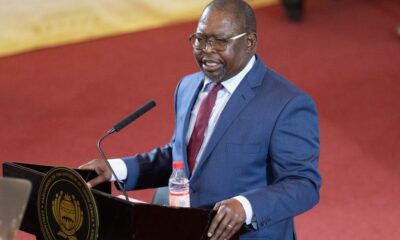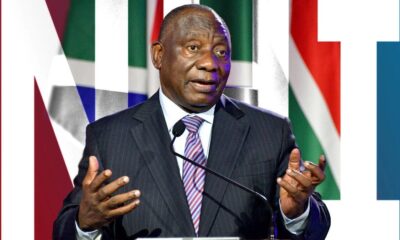News
Rand Manipulation Case: Ngcukaitobi Says Global Banks Targeted SA’s Sovereignty

A courtroom battle over the rand
This week, the Constitutional Court heard arguments that go to the very heart of South Africa’s financial sovereignty: can global banks be held accountable here for allegedly manipulating the rand-dollar exchange rate?
For years, the Competition Commission has fought to bring 28 local and international banks, including heavyweights like Standard Bank, Nedbank, and FirstRand to answer for claims that traders colluded on Bloomberg’s instant messaging platform to move the rand. The alleged collusion, regulators say, didn’t just affect markets, it struck directly at the country’s economic stability.
Inside court, Advocate Tembeka Ngcukaitobi didn’t mince his words. “They targeted the sign of our sovereignty, which is the rand,” he told the judges, calling the case a defining test for South Africa’s ability to police international cartels.
Years of legal ping-pong
The matter has been dragging since 2017, repeatedly delayed by procedural challenges. The Competition Appeal Court dismissed the complaint against 17 banks last year, forcing the Commission to escalate to the Constitutional Court.
Mokgale Mohlala, who heads the Commission’s cartels division, expressed frustration outside court. “It has become impossible to prosecute cartels because we never get to the merits. We are always stuck in objections,” he said.
The banks, for their part, argue two main points: that foreign-based institutions cannot be prosecuted under South African jurisdiction, and that the evidence against local banks is insufficient.
Why jurisdiction matters
The question of jurisdiction is the crux. Mohlala warned that if South Africa’s top court rules against the Commission, it would leave a dangerous vacuum:
“If you say they don’t have jurisdiction, then it means absolutely no one will prosecute these banks for manipulating the rand. That means the rand can be manipulated by anyone, without intervention,” he cautioned.
This argument speaks to the unique challenge of regulating financial markets. The rand, like other currencies, is traded globally. If traders in New York or London collude to shift its value, the impact is felt immediately in Johannesburg and Cape Town, but who has the right to hold them accountable?
The evolution of cartels
Ngcukaitobi also raised a bigger concern: the changing nature of cartels. No longer confined to local price-fixing or small-scale collusion, modern cartels are sprawling, transnational, and sophisticated. “Cartels have evolved. They are now bigger, complex, and transnational. And this case is a classic example,” he argued.
Competition experts say proving collusion is rarely about catching an explicit handshake deal. Instead, patterns of identical market behaviour, banks consistently pricing in lockstep are the smoking gun.
Public reaction: anger and fatigue
On social media, many South Africans voiced anger that global banks could toy with their currency while the case drags on in legal deadlock. “This is why bread and fuel prices feel like they’re decided in London, not Pretoria,” one user posted on X. Others were more cynical, predicting the case would “die a slow death in courts” like many corporate scandals before it.
What’s at stake
For ordinary South Africans, the rand is more than a trading code, it dictates the price of food, petrol, and imported goods. When its value is manipulated, households feel it immediately.
The Constitutional Court’s eventual ruling won’t just decide whether the banks face trial. It will set a precedent for whether South Africa has the teeth to confront global financial cartels or whether its sovereignty can be undermined with impunity.
{Source: News24}
Follow Joburg ETC on Facebook, Twitter , TikTok and Instagram
For more News in Johannesburg, visit joburgetc.com



























